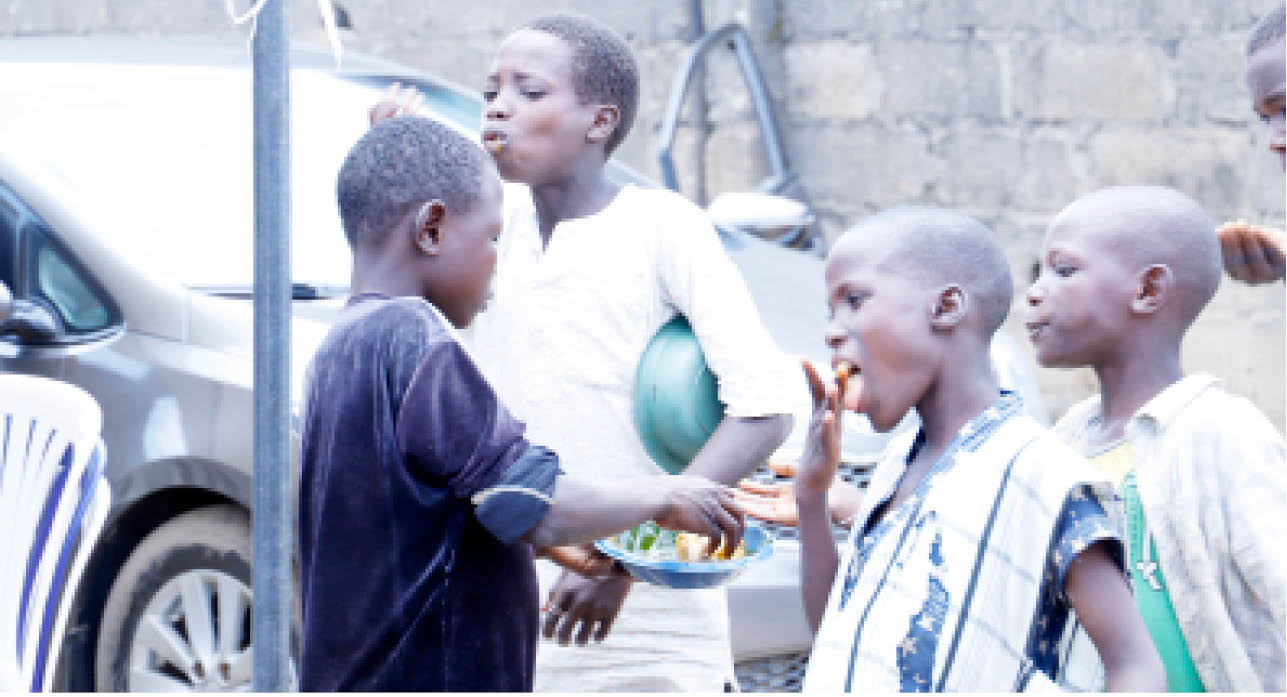Hundreds of almajirai have returned to the streets months after Northern state governors banned the almajirci in their states.
At the onset of the COVID-19 pandemic, some Northern state governors spent millions evacuating almajirai to their home states and some outrightly banned the almajirci practice.
- Quit notice: Youths attack Fulani communities in Oyo
- COVID-19: One year after Wuhan lockdown, Nigeria, others still suffering
However, despite the confusion relocating the almajirai generated among state governors, many children are seen in their numbers, in tattered clothes and with begging bowls in the streets of Zuba, Bauchi, Lafia, Kano and Kaduna.
Our correspondent in Bauchi observed an increasing number of almajirai at different markets, motor parks, petrol stations, local food joints and prominent junctions in the state capital particularly Wunti Roundabout, where they spend the day begging for alms.
Almajirai were also seen on major roads, streets, and popular junctions begging for food and money, a situation that exposes them to traffic and other dangers.
Daily Trust recalled that the Bauchi State Government had last year repatriated hundreds of almajirai to their states of origin and received another set from neighbouring states who were reunited with their parents.
Surajo Hamza, 13, was repatriated to his village in Sheme, Lere LGA in Kaduna State. He returned to Bauchi two weeks ago.
“Our Malam, Malam Sani, went to our village two weeks ago and brought us back to Bauchi,” he said. “I was among hundreds of almajirai who were repatriated from Bauchi State to our state of origin.”
Yusuf Rabe, 10, from Dagolo village in Katsina State is now an almajiri at Unguwar Kurmi in Bauchi metropolis.
“It was my brother who brought me back to Bauchi six weeks ago to Alaramma school in Unguwar Kurmi. I don’t know why they brought me back to Bauchi because I was taken back to my parents,” he said.
A resident, Garba Mohammed, said that the state government was not sincere about its ban of the almajiri system because, “There is no practical step to monitor the implementation of the ban, neither is there an arrangement to enforce the ban. Any filling station you enter in the metropolis you see these children chasing you for alms.”
The proprietor of a tsangaya school under the leadership of Sheikh Dahiru Usman Bauchi had rejected the ban on the almajirci system by the northern state governors, describing the move as callous, discriminatory, and a conspiracy against Qur’anic knowledge.
The Bauchi State Commissioner of Religious Affairs and Community Relation, Ado Sarkin Aska Zigau, when contacted on phone declined to comment and insisted on a face-to-face encounter.
When our reporter requested to meet the commissioner, he dropped the call.
However, the Commissioner of Education, Dr Aliyu Usman Tilde said that the government is aware of the return of the almajirai and a committee is at work to find solutions to the challenge.
“The committee is still working and consulting with critical stakeholders on a gradual process to enforce the ban because this system has been in place for over 1,000 years,” he said.
Tilde explained that the committee had already directed the local government councils, through their welfare offices, to commence preparations for a smooth process of implementing the new approach to tackle the problems.
At the onset of COVID-19, the Kano State Government announced a ban on street begging by almajirci.
The move was supposed to usher the almajirci system into the policy of free and compulsory primary and junior secondary school education in the state.
In April, the state government evacuated hundreds of almajirai who are not indigenes of the state to their home states.
Daily Trust observed that some of these almajirai have returned to the streets of the state’s metropolis, begging for alms with zero compliance to COVID-19 protocols.
Ismail Sani, an indigene of Batsari in Katsina State said he and his colleagues returned to Kano about three months ago as they could not stay with their parents because life is better in Kano.
A group of almajirai begging along BUK Road said they have been in the state as their teacher did not allow them to go back to their parents.
“He kept us away from street begging. We only went to neighbouring houses to seek for food. But now that we see our counterparts resurface in the state, we join them,” one of them said.
They said their only means of survival is through alms. Their teacher, they said, also collects a weekly levy from them from the money they get from begging.
A resident, Malam Ali Mu’azu, said there is no way the government can succeed in stopping street begging without collaborating with neighbouring states because the majority of beggars come from those states.
Another resident said he is not happy with the return of the almajirai as they, according to him, have become a menace to society.
Malam Rabi’u Garba, a ward head, said for the ban to work, there has to be collaboration between the government, community leaders and tsangaya scholars.
“The government has to sit with the tsangaya scholars and understand why they engage in begging, get some statistics, know the total number of those engaged in street begging. They should also include community leaders who can report any alaramma (teacher) that allows his almajirai to go begging,” he said.
When contacted, the state’s Commissioner of Education, Muhammad Sanusi Kiru asked our correspondent to come to his office but upon getting there, he said he could not comment on the story.
In Abuja, there is also a ban on street begging, forcing the almajirai to move to satellite towns and slums.
One of the almajirai in Zuba, Yusuf Ibrahim, from Bauchi State, said during the lockdown, his teacher sent all of them back home where he spent three months doing nothing.
When the lockdown was lifted his parents sent him back.
“I came back to Abuja three weeks ago and when I was at home, I was doing nothing.
“My parents put me in a car going to Abuja and since then, I have been going to Islamiya and begging when I am not there,” Ibrahim said.
In Kaduna, almajirai who returned were mostly found within communities in the state.
A few of them were seen on major roads as they operate in isolation to avoid arrest by government officials.
Some of their teachers declined to comment but an Islamic teacher at Rigasa, who does not operate tsangaya school, Malam Aliyu Suleiman, said some of the schools in the area operate secretly.
“I saw some almajirai children studying in their schools but as you know, they will not want to be identified since the government is against it,” he said.
Asked if they abide by the COVID-19 protocols he said, “You know they don’t because it will be difficult to do that due to the number of the children.”
A resident of Zaria who simply gave his name as Salisu said most of the schools still operate in Zaria.
“Almajirai are found in Zaria too and they are still studying in their schools,” he said.
The Commissioner, Human Services and Social Development, Hajiya Hafsat Baba said the state government has a Special Taskforce that comprises staff from her ministry, Kaduna State Law Enforcement Agency KASTELEA, Civil Defence, Police and other relevant agencies that are involved in the evacuation of the almajirai
She said they are aware the children are returning to the streets because their malams are using them as a source of income.
“You know the more children they have, the more money they will get and the government is not against them using a modern school to register with SUBEB or quality assurance by obtaining all necessary documentation to operate like any private schools, so that we can remove these children from the streets,” she said.
The commissioner further explained that the government is collating a data of some of the almajirai that are Kaduna indigenes.
“So far, we have captured about 10,000 supported by UNICEF and they are going to be enrolled in schools.
“The truth is that most of the parents of these children are to be blamed because they are responsible for producing children they cannot cater for. They have abandoned their responsibilities.
“People need to understand that they cannot continue to give birth to children and leave their responsibilities to government,” she said.
Daily Trust reports that the Kaduna Special Taskforce on the Enforcement of COVID-19 guidelines had few days ago raided Sheikh Dahiru Usman Bauchi’s Almajirai School located at Askolaye and evacuated 162 children.
Out of the Almajirai evacuated by the task force, nine were foreigners from Niger Republic, Burkina Faso, and the Benin Republic.
The Chairman of the taskforce, Garba Yahaya Rimi, said “We have 5 from the Niger Republic 5, Burkina Faso 3, and the Benin Republic 1.
This is what they said because we had to ask them one after the other but two children couldn’t explain themselves well. So, in total we have 162 children.”
He further added that the committee will also expand the operations to other places within the state.
A senior teacher at the school, Malam Nasiru Abdulrahman, confirmed the raid.
He described the development as very wrong, saying the children were loaded in vehicles by soldiers, police, and other security agencies that stormed the school.
By Hassan Ibrahim, Lubabatu Garba, Faruk Shuaibu and Mohammed I. Yaba

 Join Daily Trust WhatsApp Community For Quick Access To News and Happenings Around You.
Join Daily Trust WhatsApp Community For Quick Access To News and Happenings Around You.


